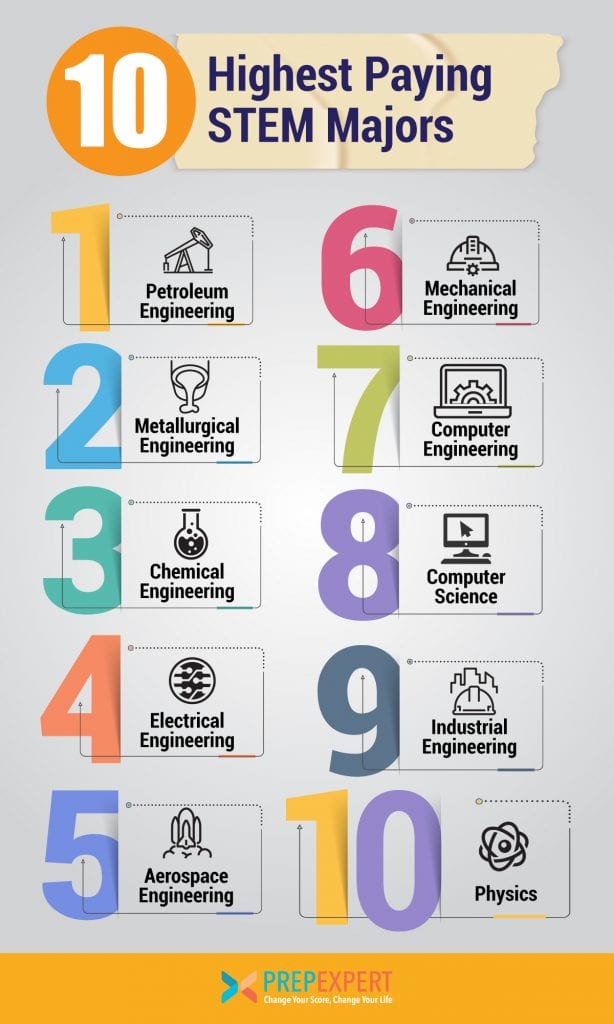Highest Paying STEM Majors
If high-earning potential is your biggest goal for college, then don’t be afraid of a STEM-related major. The fields of science, technology, engineering, and math are known to have extensive wage growth and high salaries to begin with. To help consider your options, learn more about the highest paying STEM majors out there.
If making as much money as possible is your post-college goal, then it’s hard to go wrong with a STEM degree. Here then are the highest paying STEM majors to consider.
Here are some of the hardest college majors that college students study.
Petroleum Engineering
Learn to safely extract hidden reserves of crude oil and natural gas.
Petroleum engineers are in the business of developing methods of locating these natural resources and safely extracting them efficiently. Common courses in this major include:
- Fluid Dynamics
- Geology
- Thermodynamics
Petroleum engineers make, on average, over $135 thousand per year. Employment opportunities for them exist with energy companies, as well as research and consulting firms.
Metallurgical Engineering
Learn how to extract and manipulate various metals for commercial purposes.
Metallurgical engineers work with basically nothing but metals like aluminum, copper, iron, steel, zinc, etc. Their job is to learn how to extract them from the earth, and then combine and manipulate them for commercial applications like industrial alloys.
Metallurgical engineers earn, on average, approximately $97 thousand dollars per year, and can work with any business that refines or produces metal-related products.
Chemical Engineering
Manipulate chemical processes for developing commercially valuable products.
Chemical engineers are needed in most manufacturing fields, whether it’s food, energy, electronics, etc. Their job is to design and develop processes that manipulate the chemical properties of inorganic or organic matter. They make approximately $96 thousand dollars per year and can work in research settings, industrial plants or refineries.
Electrical Engineering
Electrical engineers work in every manner of electrical equipment.
It doesn’t matter what industry or purpose, an electrical engineer is necessary for everything to work properly. Typical courses include:
- Circuit Design
- Electrodynamics
- Signal Processing
Earning, on average, $93 thousand per year, electrical engineers are commonly found in the construction, energy, manufacturing, and telecommunications industries.
Aerospace Engineering
Create the next generation of airborne vehicles.
Aerospace engineers concern themselves with everything related to flight:
- Airplanes
- Rockets
- Satellites
They exist to design the vehicles themselves and how they operate. Common courses include:
- Airframe Design
- Avionics
- Flight Mechanics
- Structural Analysis
- Thermodynamics
There are even program tracks for aerospace engineers to choose working on spacecraft alone if you so wish. These engineers earn approximately $90 thousand a year by figuring out how to place manmade vehicles in the sky.
Mechanical Engineering
These engineers work with any machine that involves motion.
Mechanical engineers design and build any machines that somehow involve motion. Common examples include:
- Airplanes
- Cars
- Turbines
- Compressors
- Sensors
- Drones
Anything at all that involves motion requires a mechanical engineer eventually. Earning, on average, over $86 thousand dollars per year, mechanical engineers work in a diverse range of industries:
- Aerospace
- Automotive
- Biotechnology
- Electronics
- Manufacturing
Computer Engineering
This major focuses primarily on computer hardware.
Computer engineers learn a blend of electrical engineering and computer science. They design and build computer hardware components:
- Circuit Boards
- Hard Drives
- Memory Chips
- Microprocessors
- Routers
Earning over $86 thousand per year, on average, these engineers work primarily in the computer and electronics industries.
Computer Science
Computer science majors focus on software design and application.
Anyone studying this major learns how to analyze, build, and maintain computer software applications. Common courses include:
- Data Structures
- System Architecture
- Discrete Mathematics
- Logic
Role-wise, computer science majors can tackle a variety of high-paying roles:
- Computer Programmer
- Database Administrator
- Network Administrator
- Systems Analyst
Computer science majors can earn upwards of $82 thousand per year, depending on their specific role and company.
Industrial Engineering
Streamline manufacturing processes to reduce inefficiencies.
Industrial engineers make the manufacturing process more efficient overall. Your job is to design the most effective means to utilize equipment, materials, and employees to their fullest potential.
Not only that, but you have to do so while reducing costs and maintaining quality. For that work, expect to make around $81 thousand per year on average.
Physics
Physics major graduates learn highly applicable analytic and quantitative skill sets.
Focus-wise, physics majors study the laws of the universe, particularly the relationships between matter and energy. Expect to investigate phenomena as small as molecules or as large as galaxies.
The real benefit lies in the learned analytical tools, which are applicable in many fields including:
- Electronics
- Energy
- Finance
- Information Technology
- Telecommunications
Physics majors can earn up to $81 thousand a year, depending on their particular role and company opportunities.
For more test strategy, college admissions, and scholarship application tips sign up for our FREE class happening right now!
Written by Dr. Shaan Patel MD MBA
Prep Expert Founder & CEO
Shark Tank Winner, Perfect SAT Scorer, Dermatologist, & #1 Bestselling AuthorMore from Dr. Shaan Patel MD MBA

How to Get Into Stanford: Breaking Down Stanford Admission Requirements in 2024
Applying to college is overwhelming no matter what schools are on your list, but you might find yourself sweating a…

Why DEI is Destroying Meritocracy and How MEI Can Save Us
In recent years, Diversity, Equity, and Inclusion (DEI) initiatives have become a cornerstone of many corporate and educational policies. While…

Should I Take an SAT Prep Course?
If you’re getting ready to take the SAT soon, you might be wondering whether or not you should enroll in…
